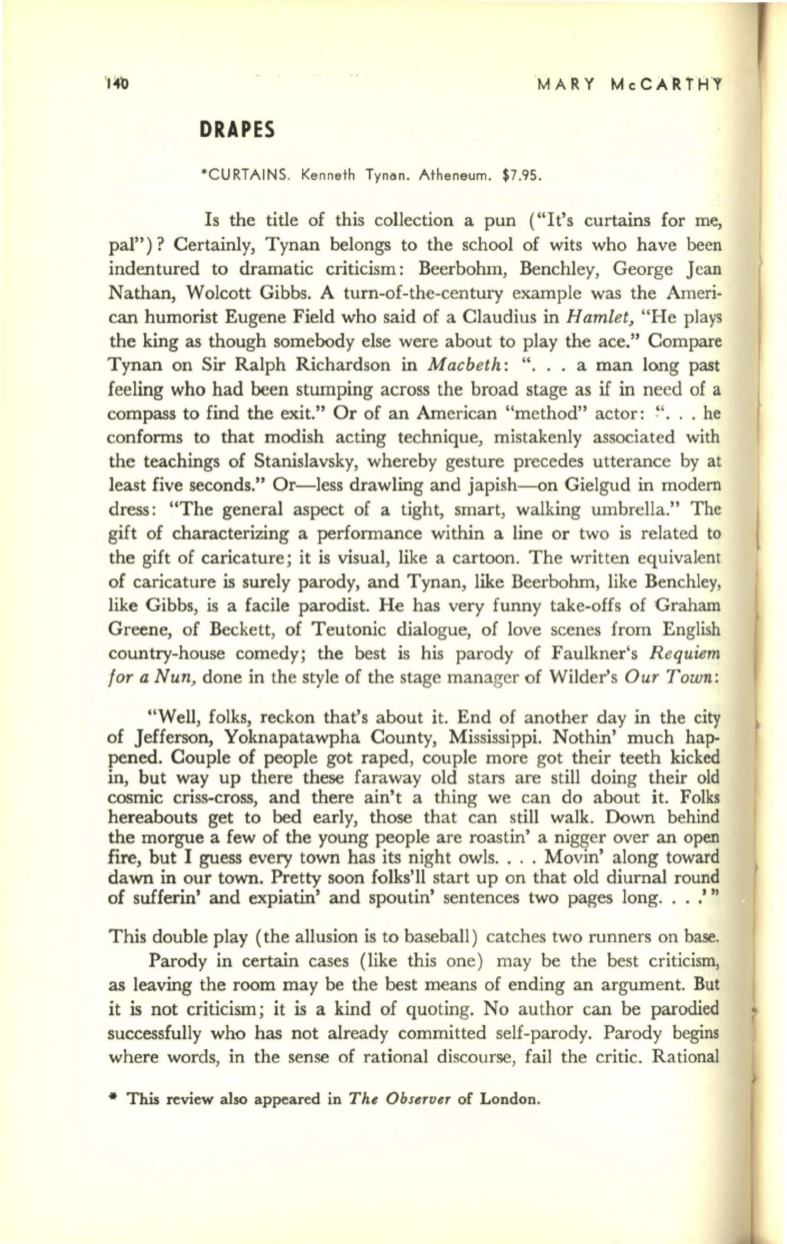
MAR Y M
c
CAR TH'Y
DRAPES
'CU RTAI NS. Kenneth Tynlln. Atheneum. $7.95.
Is the title of this collection a pun ("It's curtains for me,
pal")? Certainly, Tynan belongs to the school of wits who have been
indentured to dramatic criticism: Beerbohm, Benchley, George Jean
Nathan, Wolcott Gibbs. A turn-of-the-century example was the Ameri–
can humorist Eugene Field who said of a Claudius in
Hamlet,
"He plays
the king as though somebody else were about to play the ace." Compare
Tynan on Sir Ralph Richardson in
Macbeth:
"... a man long past
feeling who had been stumping across the broad stage as
if
in need of a
compass to find the exit." Or of an American "method" actor:
~'
.. . he
conforms to that modish acting technique, mistakenly associated with
the teachings of Stanislavsky, whereby gesture precedes utterance by at
least five seconds." Or-less drawling and japish-on Gielgud in modem
dress: "The general aspect of a tight, smart, walking umbrella." The
gift of characterizing a performance within a line or two is related to
the gift of caricature; it is visual, like a cartoon. The written equivalent
of caricature is surely parody, and Tynan, like Beerbohm, like Benchley,
like Gibbs, is a facile parodist. He has very funny take-offs of Graham
Greene, of Beckett, of Teutonic dialogue, of love scenes from English
country-house comedy; the best is his parody of Faulkner's
R equiem
for a Nun,
done in the style of the stage manager of Wilder's
Our Town:
"Well, folks, reckon that's about it. End of another day in the
city
of Jefferson, Yoknapatawpha County, Mississippi. Nothin' much hap–
pened. Couple of people got raped, couple more got their teeth kicked
in, but way up there these faraway old stars are still doing their old
cosmic criss-cross, and there ain't a thing we can do about it. Folks
hereabouts get to bed early, those that can still walk. Down behind
the morgue a few of the young people are roastin' a nigger over an open
fire, but I guess every town has its night owls. . . . Movin' along toward
dawn in our town. Pretty soon folks'll start up on that old diurnal round
of sufferin' and expiatin' and spoutin' sentences two pages long. . . .'''
This double play (the allusion is to baseball) catches two runners on base.
Parody in certain cases (like this one ) may be the best criticism,
as leaving the room may be the best means of ending an argument. But
it is not criticism;
it
is a kind of quoting. No author can be parodied
successfully who has not already committed self-parody. Parody begins
where words, in the sense of rational discourse, fail the critic. Rational
*
This review also appeared in
The Observer
of London.


